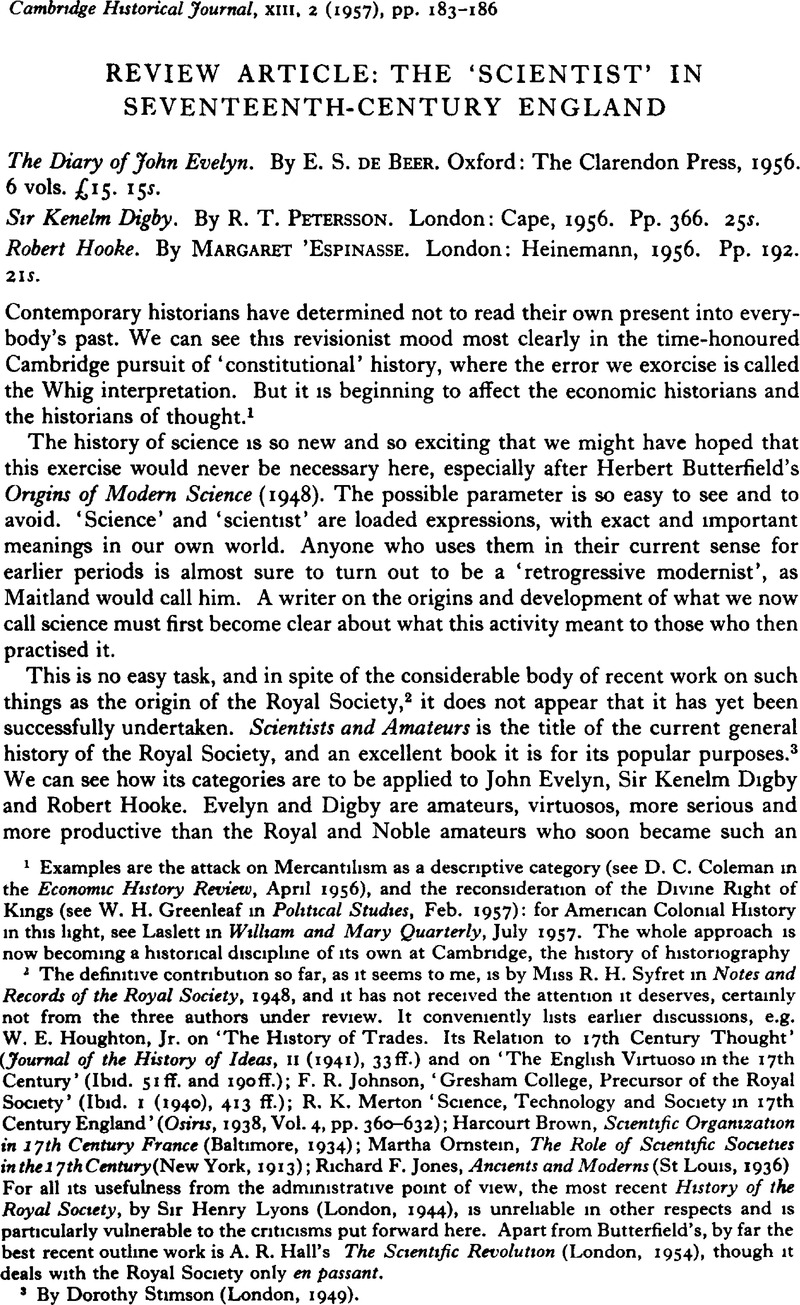Article contents
The ‘Scientist’ In Seventeenth-Century England
Published online by Cambridge University Press: 20 December 2011
Abstract

- Type
- Review Article
- Information
- Copyright
- Copyright © Cambridge University Press 1957
References
1 Examples are the attack on Mercantilism as a descriptive category (see Coleman, D. C. in the Economic History Review, April 1956)Google Scholar, and the reconsideration of the Divine Right of Kings (see Greenleaf, W. H. in Political Studies, Feb. 1957)Google Scholar: for American Colonial History in this light, see , Laslett in William and Mary Quarterly, July 1957.Google Scholar The whole approach is now becoming a historical discipline of its own at Cambridge, the history of historiography
2 The definitive contribution so far, as it seems to me, is by Miss Syfret, R. H. in Notes and Records of the Royal Society, 1948Google Scholar, and it has not received the attention it deserves, certainly not from the three authors under review. It conveniently lists earlier discussions, e.g. Houghton, W. E., Jr. on ‘The History of Trades. Its Relation to 17th Century Thought’ (Journal of the History of Ideas, II (1941), 33ff.)CrossRefGoogle Scholar and on ‘The English Virtuoso in the 17th Century’ (Ibid. 51ff. and 190ff.); F. R. Johnson, ‘Gresham College, Precursor of the Royal Society’ (Ibid. I (1940), 413 ff.); Merton, R. K. ‘Science, Technology and Society in 17th Century England’ (Osirts, 1938, Vol. 4, pp. 360–632)Google Scholar; Brown, Harcourt, Scientific Organization in 17th Century France (Baltimore, 1934)Google Scholar; Ornstein, Martha, The Role of Scientific Societies in the 17 th Century (New York, 1913)Google Scholar; Jones, Richard F., Ancients and Moderns (St Louis, 1936)Google Scholar For all its usefulness from the administrative point of view, the most recent History of the Royal Soctety, by Sir Lyons, Henry (London, 1944)Google Scholar, is unreliable in other respects and is particularly vulnerable to the criticisms put forward here. Apart from Butterfield's, by far the best recent outline work is Hall's, A. R. The Scientific Revolution (London, 1954)Google Scholar, though it deals with the Royal Society only en passant.
3 By Dorothy Stimson (London, 1949).
4 It does not take the very much wanted analysis of early modern Aristotelianism anywhere near the point which has been reached by Mrs D. Krook of Cambridge, whose rigorous work on such thinkers as White and Sergeant is to be published in the ‘History of Ideas’ series.
5 There is a generous willingness to make these methods available to us. Professor Boyd addressed the Anglo-American Historical Conference in July 1957.
6 Mr J. A. Rose of King's College, Cambridge, is examining the nature of the Royal Society's interest in extra-European societies.
7 Mr P. Abrams, of Peterhouse, Cambridge, finds signs of local activity of the Royal Society sort amongst the communities of county gentry.
8 See 'Espinasse, p. 27, Lyons, op. cit. p. 109.
9 See Cranston, Maurice, Locke (London, 1957).Google Scholar
10 Science and Social Welfare in the Age of Newton (1st ed. Oxford, 1937, 2nd ed. 1948), 77–8.Google Scholar
- 1
- Cited by


